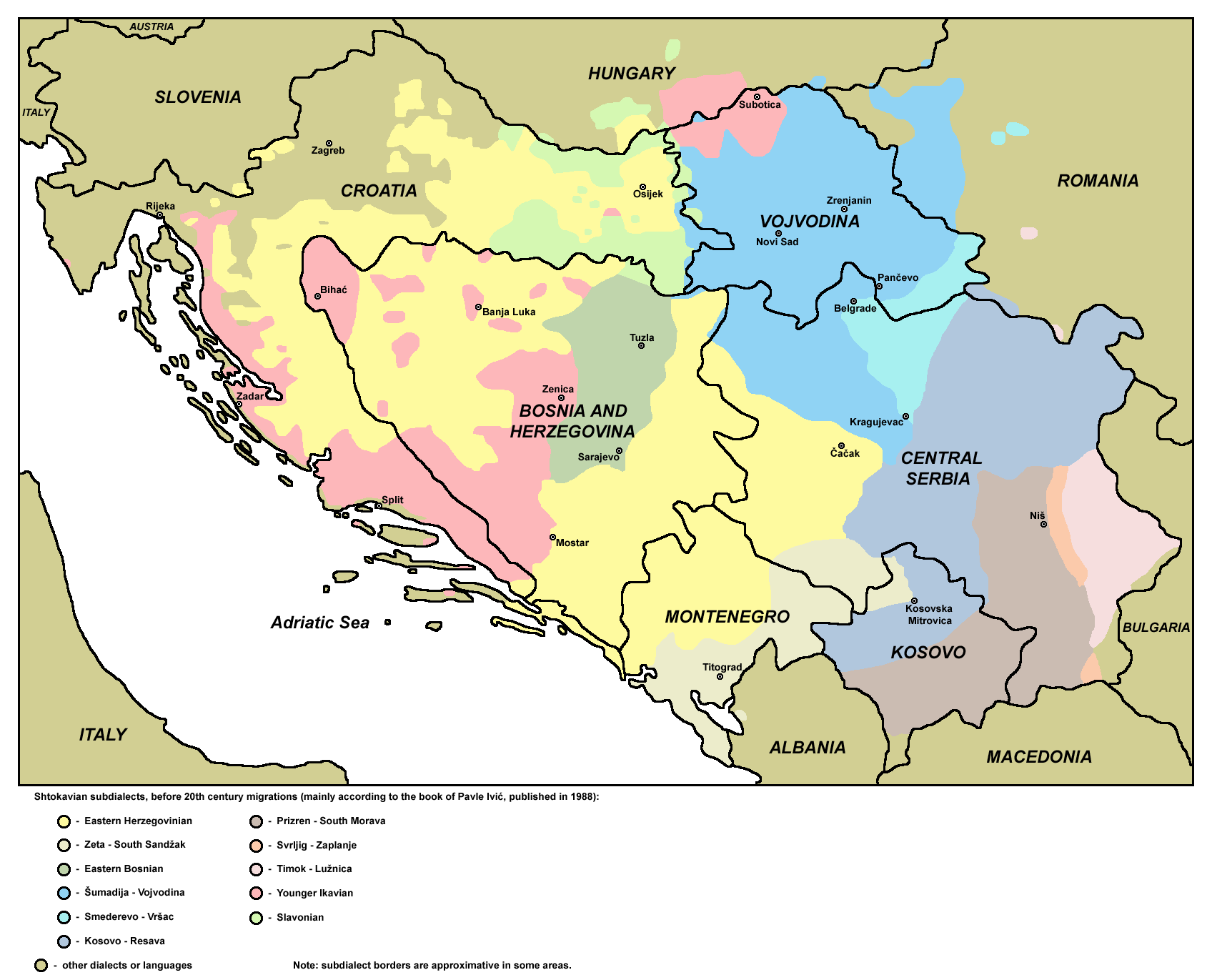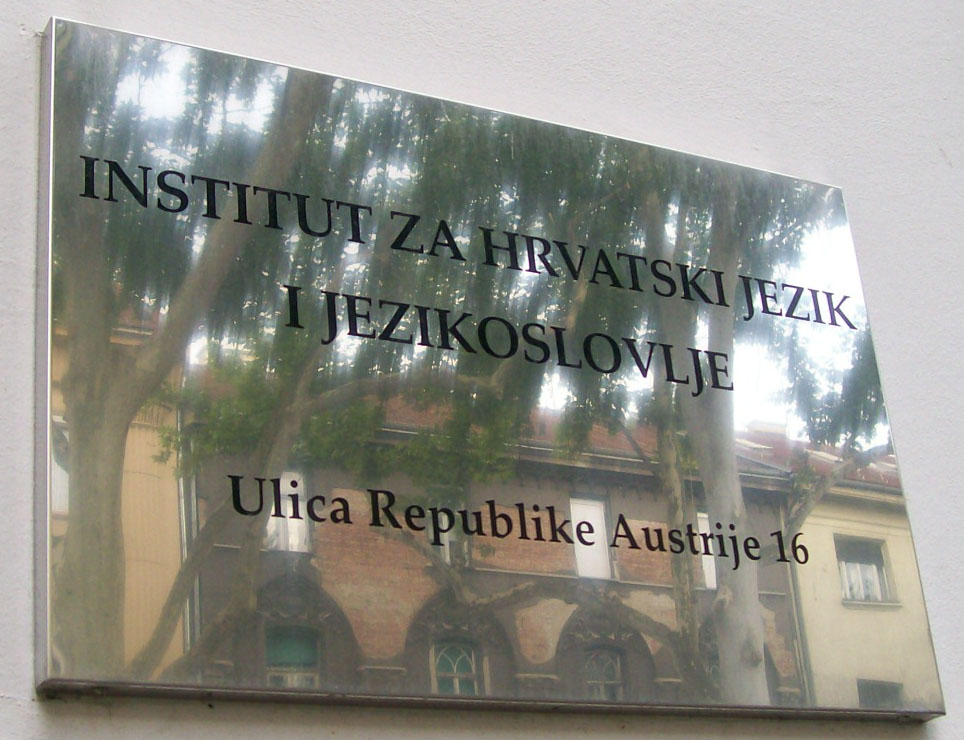|
Croatian Language
Croatian (; ' ) is the standardized variety of the Serbo-Croatian pluricentric language used by Croats, principally in Croatia, Bosnia and Herzegovina, the Serbian province of Vojvodina, and other neighboring countries. It is the official and literary standard of Croatia and one of the official languages of the European Union. Croatian is also one of the official languages of Bosnia and Herzegovina and a recognized minority language in Serbia and neighboring countries. Standard Croatian is based on the most widespread dialect of Serbo-Croatian, Shtokavian, more specifically on Eastern Herzegovinian, which is also the basis of Standard Serbian, Bosnian, and Montenegrin. In the mid-18th century, the first attempts to provide a Croatian literary standard began on the basis of the Neo-Shtokavian dialect that served as a supraregional ''lingua franca'' pushing back regional Chakavian, Kajkavian, and Shtokavian vernaculars. The decisive role was played by Croatian Vukovia ... [...More Info...] [...Related Items...] OR: [Wikipedia] [Google] [Baidu] |
Croats
The Croats (; hr, Hrvati ) are a South Slavic ethnic group who share a common Croatian ancestry, culture, history and language. They are also a recognized minority in a number of neighboring countries, namely Austria, the Czech Republic, Germany, Hungary, Italy, Montenegro, Romania, Serbia, Slovakia and Slovenia. Due to political, social and economic reasons, many Croats migrated to North and South America as well as New Zealand and later Australia, establishing a diaspora in the aftermath of World War II, with grassroots assistance from earlier communities and the Roman Catholic Church. In Croatia (the nation state), 3.9 million people identify themselves as Croats, and constitute about 90.4% of the population. Another 553,000 live in Bosnia and Herzegovina, where they are one of the three constituent ethnic groups, predominantly living in Western Herzegovina, Central Bosnia and Bosnian Posavina. The minority in Serbia number about 70,000, mostly in Vojvodina ... [...More Info...] [...Related Items...] OR: [Wikipedia] [Google] [Baidu] |
WIPO
The World Intellectual Property Organization (WIPO; french: link=no, Organisation mondiale de la propriété intellectuelle (OMPI)) is one of the 15 specialized agencies of the United Nations (UN). Pursuant to the 1967 Convention Establishing the World Intellectual Property Organization, WIPO was created to promote and protect intellectual property (IP) across the world by cooperating with countries as well as international organizations. It began operations on 26 April 1970 when the convention entered into force. The current Director General is Singaporean Daren Tang, former head of the Intellectual Property Office of Singapore, who began his term on 1 October 2020. WIPO's activities include hosting forums to discuss and shape international IP rules and policies, providing global services that register and protect IP in different countries, resolving transboundary IP disputes, helping connect IP systems through uniform standards and infrastructure, and serving as a general r ... [...More Info...] [...Related Items...] OR: [Wikipedia] [Google] [Baidu] |
Official Language
An official language is a language given supreme status in a particular country, state, or other jurisdiction. Typically the term "official language" does not refer to the language used by a people or country, but by its government (e.g. judiciary, legislature, and/or administration). 178 countries recognize an official language, 101 of them recognizing more than one. The government of Italy made Italian official only in 1999, and some nations (such as the United States, Mexico and Australia) have never declared de jure official languages at the national level. Other nations have declared non-indigenous official languages. Many of the world's constitutions mention one or more official or national languages. Some countries use the official language designation to empower indigenous groups by giving them access to the government in their native languages. In countries that do not formally designate an official language, a ''de facto'' national language usually evolves. English is t ... [...More Info...] [...Related Items...] OR: [Wikipedia] [Google] [Baidu] |
Linguasphere Observatory
The Linguasphere Observatory (or "the Observatoire", based on its original French and legal title: ''Observatoire Linguistique'') is a non-profit transnational research network, devoted (alongside related programs) to the gathering, study, classification, editing and free distribution online of the updatable text (initially in English) of a fully indexed and comprehensive ''Linguasphere Register of the World's Languages and Speech Communities.'' History The Observatoire was created in Quebec in 1983 and was subsequently established and registered in Normandy as a non-profit association under the honorary presidency of the late Léopold Sédar Senghor, a French-language poet and the first president of Senegal. Its founding director is David Dalby, former director of the International African Institute and emeritus reader in the University of London, and its first research secretary was Philippe Blanchet, a Provençal-language poet currently serving as Professor of Sociolinguistics ... [...More Info...] [...Related Items...] OR: [Wikipedia] [Google] [Baidu] |
Pluricentric Language
A pluricentric language or polycentric language is a language with several interacting codified standard forms, often corresponding to different countries. Many examples of such languages can be found worldwide among the most-spoken languages, including but not limited to Chinese in Mainland China, Taiwan and Singapore; English in the United Kingdom, the United States, India, and elsewhere; and French in France, Canada, and elsewhere. The converse case is a monocentric language, which has only one formally standardized version. Examples include Japanese and Russian. In some cases, the different standards of a pluricentric language may be elaborated until they become autonomous languages, as happened with Malaysian and Indonesian, and with Hindi and Urdu. The same process is under way in Serbo-Croatian. Examples of varying degrees of pluricentrism Arabic Pre-Islamic Arabic can be considered a polycentric language. In Arabic-speaking countries different levels of polyc ... [...More Info...] [...Related Items...] OR: [Wikipedia] [Google] [Baidu] |
Variety (linguistics)
In sociolinguistics, a variety, also called an isolect or lect, is a specific form of a language or language cluster. This may include languages, dialects, registers, styles, or other forms of language, as well as a standard variety.Meecham, Marjorie and Janie Rees-Miller. (2001) "Language in social contexts." In W. O'Grady, J. Archibald, M. Aronoff and J. Rees-Miller (eds) ''Contemporary Linguistics''. pp. 537-590. Boston: Bedford/St. Martin's. The use of the word "variety" to refer to the different forms avoids the use of the term ''language'', which many people associate only with the standard language, and the term ''dialect'', which is often associated with non-standard varieties thought of as less prestigious or "correct" than the standard.Schilling-Estes, Natalies. (2006) "Dialect variation." In R.W. Fasold and J. Connor-Linton (eds) ''An Introduction to Language and Linguistics''. pp. 311-341. Cambridge: Cambridge University Press. Linguists speak of both standard and n ... [...More Info...] [...Related Items...] OR: [Wikipedia] [Google] [Baidu] |
Standard Language
A standard language (also standard variety, standard dialect, and standard) is a language variety that has undergone substantial codification of grammar and usage, although occasionally the term refers to the entirety of a language that includes a standardized form as one of its varieties. Typically, the language varieties that undergo substantive standardization are the dialects associated with centers of commerce and government. By processes that linguistic anthropologists call "referential displacement" and that sociolinguists call "elaboration of function", these varieties acquire the social prestige associated with commerce and government. As a sociological effect of these processes, most users of this language come to believe that the standard language is inherently superior or consider it the linguistic baseline against which to judge other varieties of language. The standardization of a language is a continual process, because a language-in-use cannot be permanently sta ... [...More Info...] [...Related Items...] OR: [Wikipedia] [Google] [Baidu] |
Atlas Of The World's Languages In Danger
The UNESCO ''Atlas of the World's Languages in Danger'' is an online publication containing a comprehensive list of the world's endangered languages. It originally replaced the ''Red Book of Endangered Languages'' as a title in print after a brief period of overlap before being transferred to an online only publication. History In 1992 the International Congress of Linguists (CIPL) meeting in Canada discussed the topic of endangered languages, as a result of which it formed the Endangered Languages Committee. It held an international meeting also in 1992 in Paris to place the topic before the world and initiate action. The meeting was considered important enough to come under the authority of UNESCO. At the instigation of Stephen Wurm Stephen Adolphe Wurm ( hu, Wurm István Adolf, ; 19 August 1922 – 24 October 2001) was a Hungarian-born Australian linguist. Early life Wurm was born in Budapest, the second child to the German-speaking Adolphe Wurm and the Hungar ... [...More Info...] [...Related Items...] OR: [Wikipedia] [Google] [Baidu] |
UNESCO
The United Nations Educational, Scientific and Cultural Organization is a List of specialized agencies of the United Nations, specialized agency of the United Nations (UN) aimed at promoting world peace and security through international cooperation in education, arts, sciences and culture. It has Member states of UNESCO, 193 member states and 12 associate members, as well as partners in the Non-governmental organization, non-governmental, Intergovernmental organization, intergovernmental and private sector. Headquartered at the World Heritage Centre in Paris, France, UNESCO has 53 regional field offices and 199 national commissions that facilitate its global mandate. UNESCO was founded in 1945 as the successor to the League of Nations's International Committee on Intellectual Cooperation.English summary). Its constitution establishes the agency's goals, governing structure, and operating framework. UNESCO's founding mission, which was shaped by the Second World War, is to adva ... [...More Info...] [...Related Items...] OR: [Wikipedia] [Google] [Baidu] |
Serbo-Croatian Dialects
The dialects of Serbo-Croatian include the vernacular forms of Serbo-Croatian as a whole or as part of its standard varieties: Bosnian, Croatian, Montenegrin and Serbian. They are part of the dialect continuum of South Slavic languages that joins the Macedonian dialects to the south, Bulgarian dialects to the southeast and Slovene dialects to the northwest.Matasović 2008 The division of South Slavic dialects to "Slovene", "Serbo-Croatian", "Macedonian" and "Bulgarian" is mostly based on political grounds: for example all dialects within modern Slovenia are classified as "Slovene", despite some of them historically originating from other regions, while all dialects in modern Croatia are classified as "Croatian" (or "Serbo-Croatian" before 1990) despite not forming a coherent linguistic entity (and some are proven to originate from parts of what is today Slovenia). Therefore, "Serbo-Croatian dialects" are simply South Slavic dialects in countries where a variant of Serbo-Croati ... [...More Info...] [...Related Items...] OR: [Wikipedia] [Google] [Baidu] |
Institute Of Croatian Language And Linguistics
The Institute of Croatian Language and Linguistics ( hr, Institut za hrvatski jezik i jezikoslovlje) is an official institute in Croatia whose purpose is to preserve and foster the Croatian language. It traces its history back to 1948, when it was part of the Yugoslav Academy of Sciences and Arts (today's Croatian Academy of Sciences and Arts). The modern institute dates back to Croatia's independence in 1991. The Institute publishes ''Rasprave'', a biannual journal. Directors * Antun Barac * Stjepan Musulin (1948–1958) * Mate Hraste (1958–1965) * Ljudevit Jonke (1965–1973) * Božidar Finka (1973–1977) * Antun Šojat (1977–1982) * Božidar Finka (1982–1987) * Mijo Lončarić (1987–1996) * Miro Kačić (1996–2001) * Marko Samardžija (2001–2002) * Dunja Brozović-Rončević (2003–2011) * Željko Jozić Željko (), sometimes written Zeljko, is a South Slavic masculine given name. In Croatia, the name Željko was among the most common masculine given names ... [...More Info...] [...Related Items...] OR: [Wikipedia] [Google] [Baidu] |

.png)




